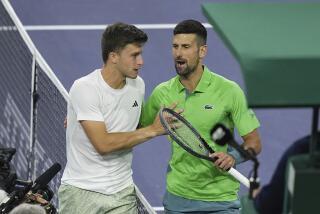Nadal, Gasquet know all about pain
- Share via
FROM NEW YORK — Rafael Nadal would be the first to say he’s coming back from sore knees and it’s no big thing.
Richard Gasquet would be the first to say he’s coming back from a raw deal and it’s a huge thing.
The two young tennis stars played a first-round match on center court at the U.S. Open on Wednesday. Nadal won, as expected. Gasquet showed flashes of brilliance in the 6-2, 6-2, 6-3 defeat, as expected.
But this was much more than your routine match. This one had connections, multiple story lines and an off-court soap opera.
Nadal’s is the easy story. He was No. 1 in the world until sore knees started to slow him. He didn’t win the French Open this year, which would have been his fifth in a row. Nor did he defend the Wimbledon title that he took from Roger Federer in a match called by many the finest ever played.
Nadal went home to Mallorca, Spain, took six weeks off and now says his knees are perfect. Still, he has slipped to No. 3 and has watched Federer win the French and Wimbledon, something more painful than sore knees, despite how much Nadal respects Federer.
Before he played his first match here, Nadal said his health “was perfect.” After he beat Gasquet, he said, “I don’t have pain, so I don’t think.”
Gasquet still has pain, the kind best described as anger and anguish.
On March 27, about to withdraw from the Sony Ericsson tournament in Miami because of a shoulder injury, the 23-year-old Gasquet went to a restaurant for dinner, met a 29-year-old waitress named Pamela, followed her to a nightclub interestingly called “Set,” and to a strip joint named “Goldrush.” There was some kissing well into the wee hours of the morning and when Gasquet went to the Miami tournament officials the next day to pull out, they gave him a drug test.
A month or so later, it was revealed that that test had yielded a positive for cocaine. Gasquet was suspended for 2 1/2 months by tennis and the handling of his case was given to an independent tribunal, as per International Tennis Federation rules. According to the rules, if a cocaine positive is determined with a player during competition, the suspension is for two years. If found when the player is outside of competition, the penalty is three months.
This can be routine. But nothing about this case would be so.
Gasquet did not accept the “cocaine positive.” His defense was that he and Pamela kissed a lot that night, that she had been using cocaine and that made his test positive. Once he decided to fight, the tribunal of three people, experts in tennis rules, the law and doping, got to rule.
As in all these things, people began to take sides. Gasquet’s own story helped. He is an only child, nurtured by protective parents and coached by his father. Several of his French teammates immediately vouched for his lifestyle as one that did not include cocaine use. A Paris forensics unit tested Gasquet and Pamela and concluded that she was, indeed, a regular cocaine user and he was not.
It is important to note that this was not an ordinary player.
Gasquet has been ranked as high as No. 7 in the world, around the time he made it to the semifinals of Wimbledon in 2007 with his stirring 4-6, 4-6, 7-6, 7-6, 8-6 quarterfinal victory over Andy Roddick that included an astonishing 93 winners. His ranking has slipped since then, but he is still among the players with top-10 credentials and reputation.
The tribunal met, ruled that Gasquet’s story was palatable, and limited his suspension to the 2 1/2 months that ended July 16. That doesn’t mean that this is over for Gasquet, who ducked that question when it was asked Wednesday.
The ITF has appealed the tribunal’s ruling and his case will be heard in the next several months by the Court of Arbitration for Sport. Joining the ITF in its action is the World Anti-Doping Agency. That partnership is dictated by the fact that tennis is an Olympic sport, and Olympic sports are guided by WADA rules and principles.
Why would the ITF appeal this? It either thinks it has a case, and/or it needs to help carry WADA’s message of being tough on doping.
So, into this morass of administrative procedures and alphabet gobbledygook falls Gasquet’s career. If he used cocaine, he deserves this nightmare. If he got unfairly popped for excessive puckering, then he is the unluckiest tennis player on the planet.
Many spoke up on his behalf, one especially notable: Nadal. Shortly after he heard the story and Gasquet’s defense, Nadal was adamant in his support. Sunday, the day before this tournament started, he was the same in his news conference.
That has not gone unnoticed by Gasquet, who was quoted recently as saying, “I’ll never forget what Rafa did for me.”
Nadal, of course, has been the subject of drugging witch hunts, making his reaction to Gasquet’s situation understandable and predictable. Nadal has muscular arms and anybody who looks the least bit beefed up in tennis, or any sport these days, becomes the subject of blogs and whispers. It’s the way of the day.
So, from a U.S. Open that, just months ago, would have yielded a possible seeding and a chance to go deep into the draw, Gasquet instead got 1 hour 41 minutes of court time, made 40 unforced errors, 30 more than his still-rusty opponent, and never even managed a break point.
At the moment, Gasquet’s world is down a set and a break and love-40.
Oh yes. Lest we forget. Pamela is suing him for defamation of character.
--
More to Read
Go beyond the scoreboard
Get the latest on L.A.'s teams in the daily Sports Report newsletter.
You may occasionally receive promotional content from the Los Angeles Times.











